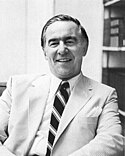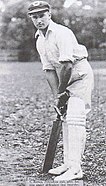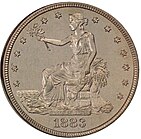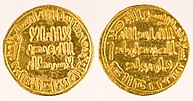Wikipedia:Today's featured article/July 2023
| << | Today's featured articles for July 2023 | >> | ||||
|---|---|---|---|---|---|---|
| Su | Mo | Tu | We | Th | Fr | Sa |
| 1 | ||||||
| 2 | 3 | 4 | 5 | 6 | 7 | 8 |
| 9 | 10 | 11 | 12 | 13 | 14 | 15 |
| 16 | 17 | 18 | 19 | 20 | 21 | 22 |
| 23 | 24 | 25 | 26 | 27 | 28 | 29 |
| 30 | 31 | |||||
July 1
Title is the debut extended play (EP) by American singer-songwriter Meghan Trainor (pictured). Trainor wrote all of its songs with its producer, Kevin Kadish. The two conceived the EP shortly after Trainor signed with Epic Records in 2014. The label released it on September 9, 2014. Inspired by doo-wop from the 1950s, Title comprises songs that lie between modern R&B and melodic pop. The EP has a lyrical theme of commitment and staying true to oneself, which Trainor hoped would empower women. It includes Trainor's debut single, "All About That Bass", which reached number one in 58 countries with worldwide sales of 11 million units. Title garnered mixed reviews from critics, who thought its tracks had potential for commercial success, but considered the lyrics too repetitive and questioned Trainor's musicality. The EP debuted at number 15 on the Billboard 200. Trainor promoted Title by performing its tracks on television shows and her concert tours. (This article is part of a featured topic: Title (album).)
July 2
Thomas A. Spragens (1917–2006) was an American administrator who was the 17th president of Centre College in Danville, Kentucky. A graduate of the University of Kentucky, Spragens worked for the state and federal government early in his career before joining the staff at Stanford University as a presidential advisor. He was the president of Stephens College in Columbia, Missouri, for a five-year term, and left Stephens for Centre in 1957. He was an effective fundraiser and was instrumental in the school's integration; Centre admitted its first black student in 1962 and hired its first black faculty member in 1971. While in office, he helped to facilitate the founding of what is now the Southern Collegiate Athletic Conference, and he attended the 1968 Democratic National Convention as a delegate to support Senator Eugene McCarthy. He resigned in 1981, at which point Centre's enrollment and faculty numbers had both nearly doubled and its endowment had grown. (Full article...)
July 3
The Mauritius sheldgoose (Alopochen mauritiana) is an extinct sheldgoose that was endemic to Mauritius. Accounts by visitors in the 17th century mentioned geese, with few details. In 1893, a wing-bone (depicted) and pelvis were attributed to a new species of comb duck, but later determined to belong to a relative of the Egyptian goose in Alopochen, a genus of sheldgeese. The bird may have descended from Egyptian geese that colonised the Mascarene Islands. This small sheldgoose had wings that were half black and half white. Although smaller than the Egyptian goose, it had more robust legs. Accounts indicate they were very tame, were grazers, lived in groups, and were usually found on the north side of the island except when seeking water to drink in the dry season. They were terrestrial, and avoided water. The species was eaten by travellers, and while abundant in 1681, it was declared extinct in 1698, probably due to overhunting and predation by introduced animals, particularly cats. (Full article...)
July 4
The Battle of Helena was fought on July 4, 1863, during the American Civil War. Union troops had been using Helena, Arkansas, as a base of operations since July 1862. More than 7,500 Confederate troops led by Theophilus H. Holmes attempted to capture Helena in hopes of relieving some of the pressure on the Confederate army besieged in Vicksburg, Mississippi. Helena was defended by about 4,100 Union troops led by Benjamin Prentiss, manning one fort and four batteries. Differing interpretations of the order by Holmes to attack at daylight resulted in James Fleming Fagan's troops attacking Battery D unsupported, and Sterling Price's attack against the Union center was made after Fagan's had largely fizzled out. To the north, Confederate cavalry commanded by John S. Marmaduke and Lucius M. Walker failed to act in concert and accomplished little. The assaults failed, and Vicksburg fell the same day. Later in the year, Union troops used Helena as a staging ground for the Little Rock campaign. (Full article...)
July 5

Lung cancer is a disease of uncontrolled cell growth that begins in the lung. It is the most diagnosed cancer worldwide and the leading cause of cancer death. Those with early lung cancer often have no symptoms, but advanced disease can cause shortness of breath, coughing (including with blood), and chest pain. The cancer can spread to other organs, increasing both the variety of symptoms and the likelihood of death. Lung cancer is treated with surgery and chemotherapy, followed by newer targeted molecular therapies and immunotherapy. Prognosis is poor, with around 19 percent of people surviving five years from their diagnoses. Lung cancer used to be a rare disease, but its incidence rose dramatically following the mass popularity of cigarettes in the 20th century. Up to 90 percent of lung cancer cases are caused by exposure to tobacco smoke, with the remainder caused by genetic factors, radon gas, asbestos, and air pollution. (Full article...)
July 6
Radiocarbon dating is used to determine the age of carbon-bearing material by measuring its levels of radiocarbon, the radioactive isotope carbon-14. Invented by Willard Libby in the late 1940s, it soon became a standard tool for archaeologists. Radiocarbon is constantly created in the atmosphere, when cosmic rays create free neutrons that hit nitrogen. Plants take in radiocarbon through photosynthesis, and animals eat the plants. After death, they stop exchanging carbon with the environment. Half of the radiocarbon decays every 5,730 years; the oldest dates that can be reliably estimated are around 50,000 years ago. The amount of radiocarbon in the atmosphere was reduced starting from the late 19th century by fossil fuels, which contain little radiocarbon, but nuclear weapons testing almost doubled levels by around 1965. Accelerator mass spectrometry (apparatus pictured) is the standard method used, which allows minute samples. Libby received the Nobel Prize in Chemistry in 1960. (Full article...)
July 7
John Mowbray, 3rd Duke of Norfolk (1415–1461), was a fifteenth-century English magnate who was the only son and heir of John Mowbray, 2nd Duke of Norfolk, and Katherine Neville. As a minor he became a ward of King Henry VI and was placed under the protection of Humphrey, Duke of Gloucester, alongside whom Mowbray would later campaign in France. He led the defence of England's possessions in Normandy during the Hundred Years' War. He fought in Calais in 1436, and in 1437 and 1438 served as warden of the Eastern March on the Anglo-Scottish border. In the early 1430s he became the bitter rival of William de la Pole, Earl (later Duke) of Suffolk. In the early years of the Wars of the Roses in the 1450s he defended King Henry against two rebellions by Richard, Duke of York. Eventually Mowbray drifted towards York, with whom he shared an enmity towards de la Pole. In March 1461, Mowbray was instrumental in King Edward IV's victory at the Battle of Towton, bringing reinforcements late in the combat. (Full article...)
July 8
The Third Test of the 1948 Ashes series was one of five Tests in the Ashes cricket series between Australia and England. It was played at Old Trafford in Manchester from 8 to 13 July 1948. After a bouncer by Ray Lindwall bloodied his head, Denis Compton left the field but returned and helped England recover to 363 all out on the second afternoon. Compton and Alec Bedser were involved in a mix-up, running out the latter and ending a 121-run partnership. Dick Pollard hit Australian Sid Barnes (pictured) in the ribs with a pull shot, hospitalising him. After rain washed out the fourth day and the first half of the fifth day, the match was drawn, meaning that England could do no better than level the series. As Australia held the Ashes, they retained them. Even though 30% of the playing time was lost to rain, the match set a record for the highest attendance at a Test match in England at 133,740, surpassing the previous Test. (This article is part of a featured topic: Australian cricket team in England in 1948.)
July 9
Tiberius III (died c. 706) was Byzantine emperor from 698 to 705. He was a mid-level commander who served in the Cibyrrhaeot Theme. In 696, he was part of an army sent by Emperor Leontius to retake Carthage from the Umayyads. After seizing the city, the army was pushed back by Arab reinforcements and retreated to Crete. Some officers, fearing Leontius, killed their commander and declared Tiberius emperor. Tiberius gathered a fleet, sailed for Constantinople, and deposed Leontius. He did not attempt to retake Byzantine Africa from the Umayyads, but campaigned against them along the eastern border. In 705, former emperor Justinian II, previously deposed by Leontius, led an army of Slavs and Bulgars from the First Bulgarian Empire to Constantinople, and deposed Tiberius. Tiberius fled to Bithynia, but was captured a few months later and beheaded between August 705 and February 706. His body was initially thrown into the sea, but was later recovered and buried in a church on the island of Prote. (Full article...)
July 10
Pasqua Rosée (fl. 1651–1658) opened the first coffee-house in London and possibly Britain. He was born in the Republic of Ragusa (now southernmost Croatia). In 1651 he became the servant of Daniel Edwards, an English merchant of the Levant Company living in Smyrna (now İzmir, Turkey); Rosée prepared Edwards's daily coffee. After Edwards returned to London, he set up Rosée as the proprietor of a coffee-house near the Royal Exchange. As Rosée was not a freeman of the City of London he was not able to trade; accordingly Edwards had the freeman Christopher "Kitt" Bowman join Rosée as a partner. The last known reference to Rosée was in 1658, after which Bowman ran the shop with his wife until his death in 1662. The building was destroyed in the 1666 Great Fire of London. On its location is a late-19th-century structure, housing—in the 21st century—a pub, the Jamaica Wine House; a commemorative plaque (shown) is now on the spot, unveiled in 1952—the tercentenary of the founding of Rosée's shop. (Full article...)
July 11
The trade dollar was a United States dollar coin minted to compete with other large silver coins that were already popular in East Asia. The idea first came about in the 1860s, when the price of silver began to decline due to increased mining efforts in the western United States. The Coinage Act of 1873 made trade dollars legal tender up to five dollars. The coins were first struck in 1873, and most of the production was sent to China. Eventually, bullion producers began converting large amounts of silver into trade dollars, causing the coins to make their way into American commercial channels. This frustrated payees, as the coins were traded for less than one dollar each. In response to their wide distribution in US commerce, the coins were officially demonetized in 1876, but continued to circulate. Production of business strikes ended in 1878, though the mintage of proof coins continued until 1883. The trade dollar was remonetized when the Coinage Act of 1965 was signed into law. (Full article...)
July 12

The Dance of the Twisted Bull is the nineteenth collection by British designer Alexander McQueen (pictured), made for the Spring/Summer 2002 season of his fashion house. It was inspired by Spanish culture and art, especially flamenco and bullfighting. Its sharp tailoring emphasises femininity and sexuality. It is McQueen's first collection after leaving Givenchy and the sale of his company to the Gucci Group in 2001. The runway show was staged during Paris Fashion Week in 2001 at the headquarters of Stade Français. It was simple compared to previous shows, and the designs were commercial and intended to drive sales for his first season under Gucci. The collection's sales were reportedly strong. Twisted Bull was received mostly positively, especially by British journalists; American writers were less impressed, particularly with the dressmaking. Dresses from the collection appeared in retrospective exhibitions: in the 2011 and 2015 stagings of Alexander McQueen: Savage Beauty, and in 2022. (Full article...)
July 13
Margaret Murray (13 July 1863 – 13 November 1963) was an Anglo-Indian Egyptologist, archaeologist, historian, and folklorist. The first female archaeology lecturer in the United Kingdom, she worked at University College London and served as president of the Folklore Society. Encouraged in her research by the department head Flinders Petrie, she established a reputation in Egyptology for her excavations of the Osireion temple and Saqqara cemetery. She taught at the British Museum and also the Manchester Museum, where she led the unwrapping of one of the mummies from the Tomb of the Two Brothers. A first-wave feminist, Murray joined the Women's Social and Political Union. She also focused her research on the witch-cult hypothesis, a theory that the witch trials of early modern Christendom were targeted at a pre-Christian religion devoted to a Horned God; this theory was later discredited, but it gained widespread attention and provided the basis for Wicca. (Full article...)
July 14
The Dark Knight is a 2008 superhero film directed by Christopher Nolan from a screenplay he co-wrote with his brother Jonathan. It is based on the DC Comics superhero Batman, played by Christian Bale (pictured), and is the second installment in The Dark Knight Trilogy and the sequel to Batman Begins (2005). In the film, Batman, police lieutenant Jim Gordon, and district attorney Harvey Dent ally to dismantle organized crime in Gotham City. They are derailed by the Joker, an anarchistic mastermind played by Heath Ledger. Ledger's posthumous awards included Academy, BAFTA, and Golden Globe awards for Best Supporting Actor. The ensemble cast also included Michael Caine, Gary Oldman, Aaron Eckhart, Maggie Gyllenhaal, and Morgan Freeman. The film was the fourth-highest-grossing film ever at the time. It has been assessed as one of the best films ever made. The Library of Congress selected it for the National Film Registry in 2020. A sequel, The Dark Knight Rises, concluded the trilogy in 2012. (Full article...)
July 15
"Sweetheart" is a song written by American singer Rainy Davis (pictured) and Pete Warner, produced with Dorothy Kessler, and originally recorded by Davis. The lyrics describe a woman's desire for a person with whom to share a romance. It was released in 1986 by independent record label SuperTronics as a single from Davis's 1987 album Sweetheart. A freestyle, hip hop pop, and synth-funk song, it appeared on R&B and dance music charts in the US. Mariah Carey recorded a cover version with rapper Jermaine Dupri for his 1998 debut album, Life in 1472, and her greatest hits album, #1's. So So Def Recordings and Columbia Records released it as a single from the former album and promoted it with a Hype Williams music video. In the US and the UK, the cover charted only on the US Billboard Bubbling Under Hot 100 and UK club charts. It reached the top twenty on the Dutch, German, and Swiss charts. In reviews, critics focused on Carey's vocal performance, Dupri's rapping style, and the cover's sexual nature. (Full article...)
July 16
Katrina Kaif (born 16 July 1983) is a British actress who works in Hindi-language films. Born in British Hong Kong, Kaif lived in several countries before moving to India, where she modelled but had difficulty finding film roles. Bollywood success came with the romantic comedies Maine Pyaar Kyun Kiya? (2005) and Namastey London (2007). Kaif's performances in the thriller New York (2009) and the romantic comedy Mere Brother Ki Dulhan (2011) earned her nominations for the Filmfare Award for Best Actress. She appeared in the action thrillers Ek Tha Tiger (2012), Dhoom 3 (2013), and Bang Bang! (2014), all of which rank among the highest-grossing Indian films. These were followed by a series of commercial failures, but her portrayal of an alcoholic actress in the romantic drama Zero (2018) earned her a Zee Cine Award for Best Supporting Actress. She participates in stage shows and is involved with her mother's charity, which works in furthering the cause of underprivileged children in India. (Full article...)
July 17
David Kelly (14 May 1944 – 17 July 2003) was a Welsh authority on biological warfare. Appointed to the United Nations Special Commission in 1991 as a chief weapons inspector in Iraq, he led ten of the organisation's missions. After the publication of a dossier in 2002, which stated that Iraq could deploy chemical and biological weapons within 45 minutes, Kelly had an off-the-record interview with Andrew Gilligan of the BBC about the claim. Gilligan's reporting stated that Alastair Campbell, the Downing Street director of communications, insisted on the 45-minute claim, something which Kelly denied saying. Kelly appeared before a parliamentary committee on 15 July 2003, and before another the next day; he was found dead near his home the day after. Tony Blair, the prime minister, set up an inquiry under Lord Hutton that concluded that Kelly had killed himself. A review led by Dominic Grieve between 2010 and 2011 backed the finding. Kelly's death has been the subject of documentaries and been fictionalised in media works. (Full article...)
July 18
The Black Cat was an American fiction magazine launched in 1895 by Herman Umbstaetter. It published only short stories, and was known for originality and for promoting new writers. It was quickly successful, aided by the popularity of "The Mysterious Card", by Cleveland Moffett, which appeared in an early issue, selling out two print runs. Two of its best-known contributors were Jack London, whose 1899 story "A Thousand Deaths" sold just as he was about to give up attempting to become a writer, and Henry Miller, whose first published works were several short fiction critiques published in 1919. The magazine's ownership changed in 1912 and 1919 as its circulation declined, and it initially ceased publication in 1920. It was revived in 1922 by William Kane, but in early 1923, with estimated circulation down to only 15,000, it ceased publication for good. The magazine's icon, a black cat that appeared on almost every cover (example pictured), was drawn by the founder's wife, Nelly Umbstaetter. (Full article...)
July 19
Al-Walid I (c. 674 – 715) was the sixth Umayyad caliph, ruling from October 705 until his death. The eldest son of Caliph Abd al-Malik (r. 685–705), he continued his father's efforts to centralize government, impose a more Arabic and Islamic character on the state, and expand its borders. He heavily depended on al-Hajjaj ibn Yusuf, his father's powerful viceroy over the eastern half of the caliphate. During his reign, armies commissioned by al-Hajjaj conquered Sind and Transoxiana in the east, while the troops of Musa ibn Nusayr, the governor of Ifriqiya, conquered the Maghreb and Hispania in the west, bringing the caliphate to its largest territorial extent. Al-Walid financed impressive public works, including the Great Mosque of Damascus, the al-Aqsa Mosque in Jerusalem, and the Prophet's Mosque in Medina. He was the first caliph to institute programs for social welfare, and his reign was marked by domestic peace and prosperity. (Full article...)
July 20
The Battle of Inverkeithing was fought on 20 July 1651 between England and Scotland. As part of the political turmoil of the English Civil War, an English army under Oliver Cromwell invaded Scotland in July 1650 and heavily defeated a Scottish army commanded by David Leslie at the Battle of Dunbar. The Scots withdrew to Stirling, a choke point. For nearly a year the English failed to storm or bypass Stirling, or to draw the Scots out into another battle. On 17 July 1651 an English force crossed the Firth of Forth at its narrowest point in flat-bottomed boats and landed at North Queensferry. The Scots sent forces to pen the English in, and the English reinforced their landing. On 20 July the Scots moved against the English and in a short engagement were routed. The English seized the deep-water port of Burntisland. Cromwell then shipped over most of the English army, marched on and captured Perth, the temporary seat of the Scottish government, cutting off supplies for the Scottish army. (Full article...)
July 21
Guitar Songs is the second extended play by American singer-songwriter Billie Eilish. Written by Eilish and Finneas O'Connell (both pictured), it was released through download and streaming services on July 21, 2022, as a surprise. Eilish decided on the surprise release because she wanted to share new music with her fans as soon as she could. Guitar Songs consists of two realist sentimental ballads, combining simple acoustic guitars that emphasize Eilish's soft vocal performance with personal lyrics that derive from contemporary life events. One of the tracks, "The 30th", is titled after the day of a friend's near-fatal car crash: November 30, 2021. In the lyrics, Eilish ponders over whether the friend would have survived had some circumstances in the accident been different. The other track, "TV", discusses eating disorders, disillusionment, and a desire for numbness to distract oneself from pressing world issues. "TV" also references the June 2022 overturning of Roe v. Wade. (Full article...)
July 22
The 1959–60 Burnley F.C. season was their 61st in the Football League, and their 13th consecutively in the First Division, the top tier of English football. Under their manager, Harry Potts, Burnley won their second First Division championship, the first since their 1920–21 season, on the last day with a 2–1 victory over Manchester City. Only Alex Elder and Jimmy McIlroy had cost a transfer fee; the other players had been recruited from Burnley’s youth academy. In cup competitions, Burnley reached the sixth round of the FA Cup, and won the Lancashire Cup. After the main season ended, the squad travelled to the United States to participate in the first edition of the International Soccer League. Eighteen players made at least one appearance for the club, with Jimmy Adamson, Brian Miller and Ray Pointer present in all 50 matches. The top goalscorer was John Connelly with 24 goals, including 20 in the league. The highest home attendance at Turf Moor that season was 52,850 for the FA Cup fifth round replay match against Bradford City. (Full article...)
July 23

Pavo is a constellation in the southern sky whose name is Latin for "peacock". It is one of twelve constellations established by Petrus Plancius from the observations of Pieter Dirkszoon Keyser and Frederick de Houtman. First appearing on a 35 cm (14 in) diameter celestial globe published in 1598 in Amsterdam by Plancius and Jodocus Hondius, it was depicted in Johann Bayer's star atlas Uranometria of 1603. Pavo's brightest member, Alpha Pavonis, is also known as Peacock and appears as a 1.91-magnitude blue-white star, but is actually a spectroscopic binary. Delta Pavonis is a Sun-like star some 19.9 light years distant. Six of the star systems in Pavo have been found to host planets, including HD 181433 with a super-Earth, and HD 172555 with evidence of a major interplanetary collision in the past few thousand years. Pavo also contains NGC 6752, the fourth-brightest globular cluster in the sky, and NGC 6744, a spiral galaxy which closely resembles our Milky Way, with a diameter twice as wide. (Full article...)
July 24

American logistics in the Normandy campaign played a key role in the success of Operation Overlord, the Allied invasion of northwest Europe during World War II. By June 1944, some 1,526,965 US troops were in the UK, of whom 459,511 were in the Services of Supply. The First United States Army was supported over the Omaha and Utah Beaches, and through the Mulberry artificial port at Omaha that was specially constructed for the purpose. The Mulberry port was abandoned after it was damaged by a storm on 19–22 June. During the first seven weeks after D-Day, the advance was much slower than the Overlord plan had anticipated, and the lodgment area much smaller. The nature of the fighting in the Normandy bocage country created shortages of certain items, particularly artillery and mortar ammunition, and there were unexpectedly high rates of loss of bazookas, Browning automatic rifles, and M7 grenade launchers. (Full article...)
July 25
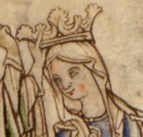
Dish-bearers and butlers were thegns who acted as personal attendants of kings in Anglo-Saxon England. Royal feasts played an important role in consolidating community and hierarchy among the elite, and dish-bearers and butlers served the food and drinks at these meals. Thegns were substantial landowners who occupied the third lay (non-religious) rank of the aristocracy in English society, after the king and ealdormen. Dish-bearers and butlers ranked above ordinary thegns in lists of witnesses to charters, and they probably also carried out diverse military and administrative duties as required by the king. No dish-bearer or butler is known to have served in the reigns of two different kings, suggesting that the position was a personal one which ended with the king's death. Some went on to have illustrious careers as ealdormen, but most never rose higher than thegn. In the later Anglo-Saxon period, queens (example depicted) and æthelings (sons of kings) also had dish-bearers. (Full article...)
July 26
Mick Jagger (born 26 July 1943) is an English singer and songwriter. He was born and grew up in Dartford, joining the rock band the Rolling Stones in 1962 as the lead vocalist and a founder member. His songwriting partnership with Keith Richards is one of history's most successful. A pioneer of the modern music industry, Jagger has been widely described as one of the most popular and influential frontmen in rock music history. Notorious for his romantic involvements and illicit drug use, he has often been portrayed as a countercultural figure. His performance style has been studied by academics and is the inspiration for the song "Moves like Jagger". He has released four solo albums and starred in two films. With the Stones, he was inducted into the Rock and Roll Hall of Fame in 1989, and into the UK Music Hall of Fame in 2004. As either a Stones member or a solo artist, he has reached No. 1 on the UK and US singles charts thirteen times, and the top 40 seventy times. He was knighted in 2003. (Full article...)
July 27
The Atlantic City–Brigantine Connector is a connector freeway in Atlantic City, New Jersey, United States. It is a 2.37-mile (3.81 km) extension of the Atlantic City Expressway, connecting it to Route 87 and Brigantine via the Marina district of Atlantic City. It is locally known as "the Tunnel" due to its tunnel underneath the Westside neighborhood. It is a state highway owned and operated by the South Jersey Transportation Authority. Proposals for a similar road date to 1964; planning began in 1995 after businessman Steve Wynn proposed a new casino in the Marina district. It was supported by Governor Christine Todd Whitman and Mayor Jim Whelan, but opposed by residents whose homes would be destroyed, and competing casino owner Donald Trump, who filed lawsuits. Its construction took almost three years and it opened in July 2001 at a total cost of $330 million. The connector serves up to 30,000 vehicles daily, and it has brought business to the casinos in the Marina district. (Full article...)
July 28
The European rock pipit (Anthus petrosus) is a small species of songbird that breeds in western Europe on rocky coasts. It has streaked greyish-brown upperparts and buff underparts, and is similar in appearance to other European pipits. There are three subspecies, of which only the Fennoscandian form is migratory, wintering in shoreline habitats further south in Europe and northwest Africa. The rock pipit is territorial at least in the breeding season, and remains so year-round where it is resident. Males will sometimes enter an adjacent territory to assist the resident in repelling an intruder, behaviour only otherwise known from an African fiddler crab. Rock pipits construct a cup nest under coastal vegetation or in cliff crevices and lay four to six speckled pale grey eggs which hatch in about two weeks. The pipits feed mainly on small invertebrates picked off the rocks or from shallow water, and occasionally catch insects in flight. The bird's population is large and stable. (Full article...)
July 29
The six Galeb-class minelayers were originally built as minesweepers for the Imperial German Navy. In July 1921, they were purchased for the Royal Navy of the newly created Kingdom of the Serbs, Croats and Slovenes (from 1929, the Kingdom of Yugoslavia). Re-armed, they were mainly used for training and "show the flag" cruises. Reclassified as minelayers by 1936, they laid mines off the Yugoslav coast just before the April 1941 Axis invasion of Yugoslavia, which probably resulted in the sinking of two Yugoslav merchant ships. All six were captured and put into Italian service escorting convoys in the Mediterranean Sea. All but one were lost or sunk during the war. The last escaped into Allied hands in September 1943 and was returned to the Yugoslav navy-in-exile at Malta in December. It was transferred to the new Yugoslav Navy after the war and helped clear thousands of mines laid in Yugoslav waters, being finally disposed of in 1962. (This article is part of a featured topic: Ships of the Royal Yugoslav Navy.)
July 30
Christopher Nolan (born 30 July 1970) is a British-American filmmaker. Known for his Hollywood blockbusters with complex storytelling, Nolan is considered a leading filmmaker of the 21st century, and has been nominated for five Academy Awards, five British Academy Film Awards and six Golden Globe Awards. His films have grossed $5 billion worldwide, and include The Dark Knight Trilogy (2005–2012), The Prestige (2006), Inception (2010), Interstellar (2014), Dunkirk (2017) and Oppenheimer (2023). Inception earned Nolan two Oscar nominations – Best Picture and Best Original Screenplay. For Dunkirk, he also earned two Oscar nominations, including his first for Best Director. He has co-written several of his films with his brother Jonathan, and runs the production company Syncopy Inc. with his wife Emma Thomas. In 2015, he was listed as one of the 100 most influential people in the world by Time, and in 2019, he was appointed Commander of the Order of the British Empire for his contributions to film. (Full article...)
July 31
Hurricane Hector was a tropical cyclone that became the eighth named storm, fourth hurricane, and third major hurricane of the 2018 Pacific hurricane season. Originating north of South America on July 22, it entered the Pacific around July 25. It became a tropical depression on July 31 and a tropical storm about 12 hours later. It rapidly intensified to its initial peak as a Category 2 hurricane. It peaked as a Category 4 hurricane on August 6, with winds of 155 mph (250 km/h) and a pressure of 936 mbar (27.64 inHg). It passed south of Hawaii's Big Island on August 8, causing high surf and necessitating the rescue of several dozen people on Oahu. It spent 186 hours at major hurricane intensity, the longest on record in the Eastern Pacific basin. It fell below that intensity on August 11. Deteriorating as it moved westward, it weakened to a tropical storm by August 13, a tropical depression by August 15, and dissipated the next day. (This article is part of a featured topic: 2018 Pacific hurricane season.)


